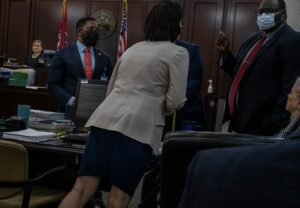Grant-funded government programs do not typically survive the kinds of challenges that Cherished Hearts, Nashville’s unique intervention court aimed at helping human trafficking suvivors, has faced since it launched.
In its five-plus years of existence, the program has spanned four judges, two executive directors, an unrelated criminal scandal involving one of those judges and most recently the COVID-19 pandemic.
On top of those obstacles, Cherished Hearts is an intricate program in terms of how it operates. Funded with a mixture of government grants and private foundation fundraising, Cherished Hearts relies on collaboration across multiple city agencies and nonprofit organizations.
The program targets human trafficking survivors, mainly women who have been used for sex against their will, and whose circumstances have put them in front of a judge whose easier option would be to hand down a jail sentence and move on to the next person on their crowded docket.
Thanks to a recently approved federal grant and the steadying leadership of General Sessions Judge Ana Escobar, Cherished Hearts is pressing on and poised to grow at a time when awareness of human trafficking is at an all-time high.

Largely flying under the radar in Nashville, Cherished Hearts represents a new frontier of criminal justice strategies where the goal is restorative, wrap-around services and an intensive, hands-on approach.
Escobar and other stakeholders are expecting an uptick this year. “It’s a sweet little program that has been through a lot including the pandemic,” Escobar said. “But, it’s still here. It’s kicking strong and it’s not going to give up. So I’m very proud of it.”
A successful program with a rocky past
The Cherished Hearts program was the brainchild of Davidson County assistant district attorneys Deb Smith and Tammy Meade, Escobar said. The DAs had been handling the prosecution of individuals charged with human trafficking related crimes. After a professional conference, the two DAs learned of a survivors’ court and began pitching the idea in Nashville, eventually leading to launching Cherished Hearts with Judge Casey Moreland overseeing the court.
Aided with a startup grant, which expired last October, Cherished Hearts was well received when it launched, receiving positive coverage in the Tennessean when its first class of graduates completed the program in 2016.
The first major problem arose when General Sessions Judge Casey Moreland, the first judge to oversee Cherished Hearts, was the subject of a criminal investigation that culminated in guilty pleas for obstruction of justice, retaliation against a witness, theft from a federally funded program, destruction of records and witness tampering.
The theft from a federally funded program charge stemmed from Moreland using a foundation affiliated with a drug court foundation. Similar to Cherished Hearts, the drug court was an alternative to prosecution programs aimed at helping individuals battling addiction.
The criminal investigation affected Cherished Hearts in two ways. First, it meant the program needed a new judge to run it. Secondly, it put increased scrutiny on similar private foundations used to help fund court programs.
Elected in 2018 after a career as a prosecutor, public defender and the appointed Metro Clerk, Escobar told the Tennessee Lookout she did not know she would be handed the reins to Cherished Hearts.
“It has opened my eyes,” Escobar said, explaining that the vast majority of women who have gone through the program battle drug and alcohol addiction in addition to other problems. “I have so much respect for people going through recovery and trying to turn their lives around. Most of them come week to week, so I get to know them personally. The court is very informal. We all sit around the table, I don’t wear a robe. It’s like friends sitting around talking.
“We celebrate accomplishments, we mourn when things go wrong. I wish all court was like this, because you get to know how people got in these situations and how hard it is to stop addiction. That has really benefited me in my regular courtroom role.”
Earlier this year, Metro Council approved a $250,000 federal grant, passed through the state, as well as $62,500 in local matching funds, which will be used to pay for a licensed clinical counselor. Escobar also recently helped launch the obviously-named Human Trafficking Court Suvivors Foundation. To avoid the kind of conflicts of interest that Moreland faced, Escobar said her role with the foundation is strictly reporting on the progress of the program, and not directing how the money is spent.
“My name’s not on the checking account or anything like that. I show up, I give a report, and I leave and allow the board to make its decisions,” she said.
While the addition of the grant funds and the re-establishment of the foundation will help with finances, the second problem Cherished Hearts had to overcome was the pandemic.
The program relies on prosecutors, judges and others working around the court to screen individuals who fit the definition of experiencing human trafficking. But, with the pandemic taking away attorney-client interactions as well as the bond docket, the number of opportunities to identify people who could be helped was diminished, she said.

“They’ll have somebody in court and they’ll start thinking, ‘Well there’s a little more to this,’” Escobar said, explaining how a district attorney or general sessions judge might recognize a person who could be caught in the snare of human trafficking. “So then they’ll ask our director to go screen the person to see if they qualify. Because, first of all, we didn’t have any bond dockets during COVID, so that limited the amount of people we were exposed to. Second of all, you wouldn’t believe how many times the jail went into quarantine, so most of the time attorneys were not able to talk to their clients except via video. That process was horrible.”
Despite being hampered by the pandemic, 20 individuals participated in the program in 2020.
Read more here.
